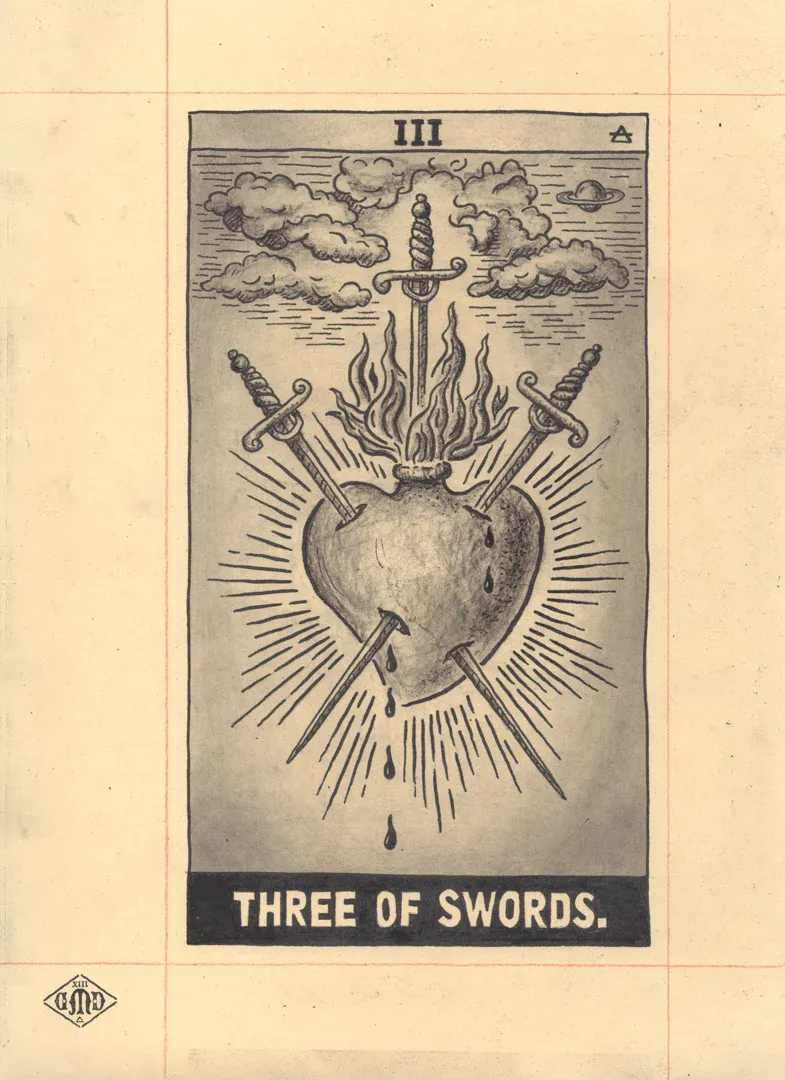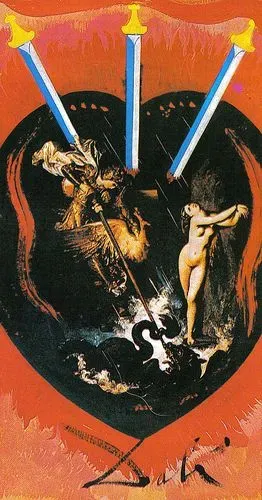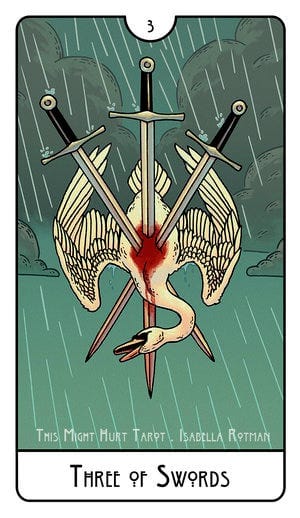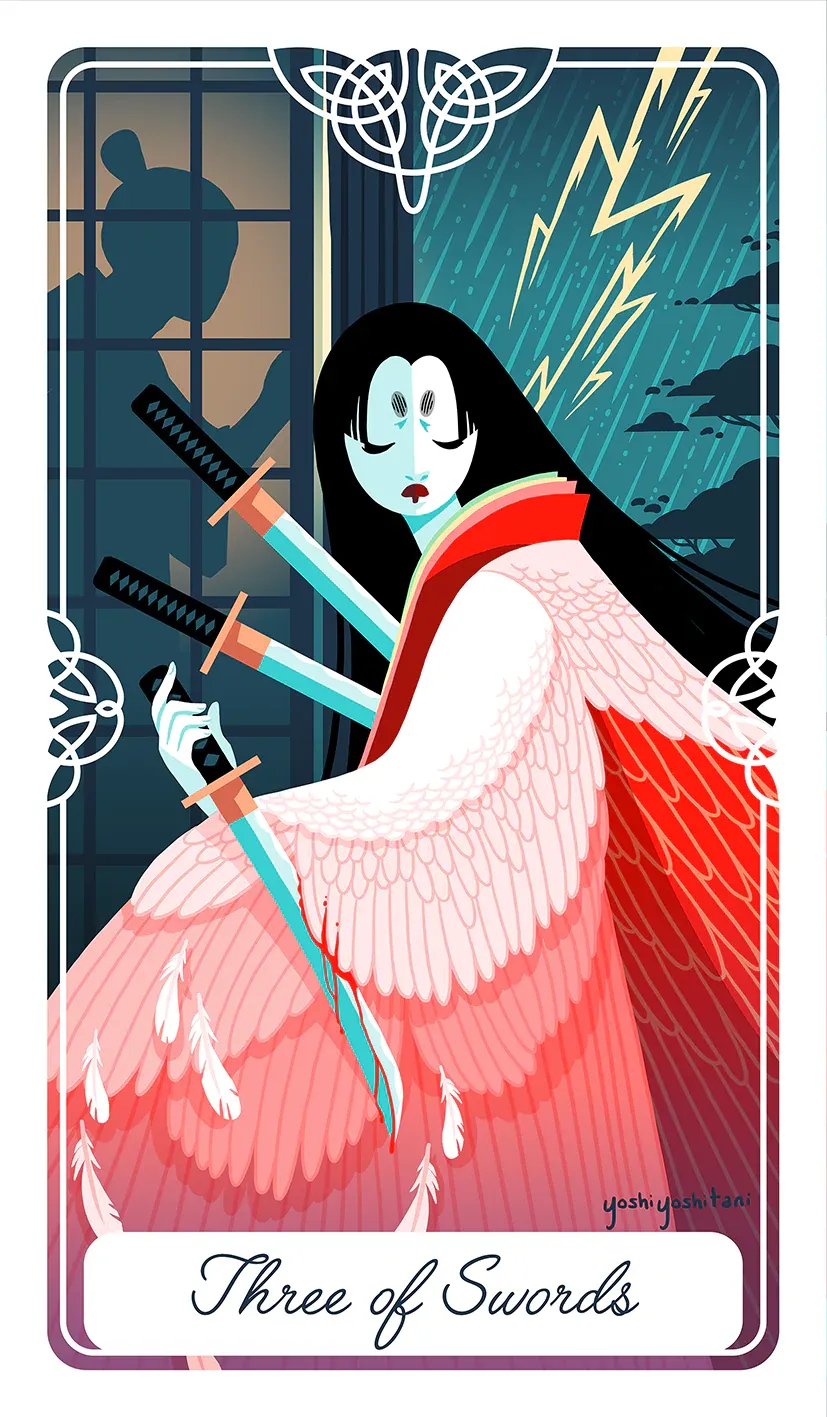Three of Swords
As a New Yorker, I knew that it was my solemn duty to hate Los Angeles, to ridicule its obsession with celebrity, its vanity and lack of public transportation.
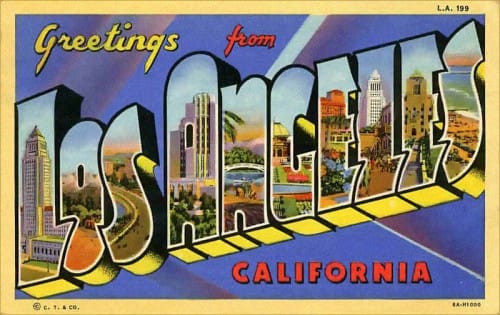
The Three of Swords depicts sorrow, heartbreak, betrayal. In the Rider Waite Colman Smith deck, a heart is speared through and through by three swords. It’s one of the clearest symbols in the deck. It’s fitting to write about the Three of Swords on the day Donald Trump is sworn in to his second term in office as my city smolders in toxic ash around me. Grief is top of mind.
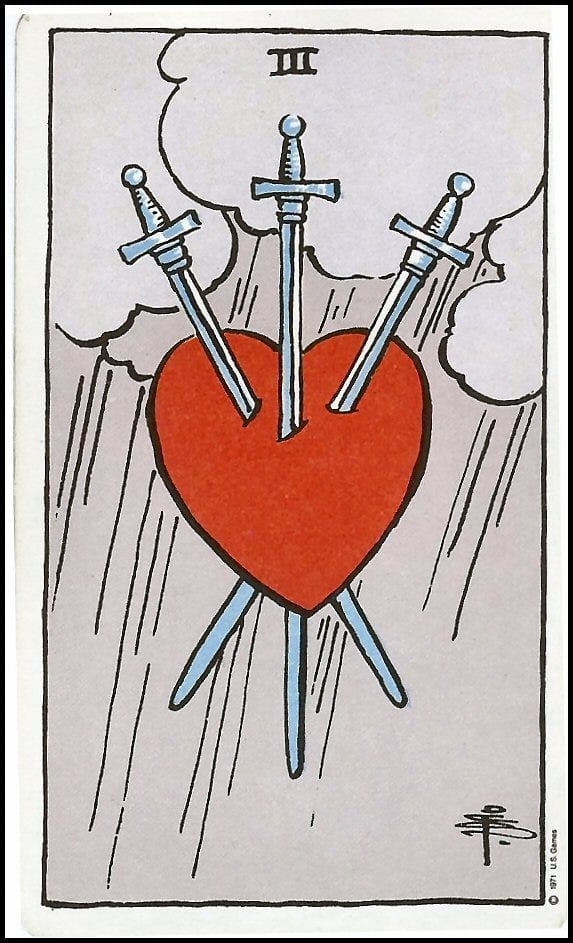
So let’s just dive right in, shall we? Heartbreak. Here we go.
Last Wednesday afternoon, I joined an informational webinar put on by an environmental agency to discuss air and water quality in LA, and what we should be aware of in the days, months, and years after the historic and devastating fires.
As the session began, one of the experts on the panel discussed how the rates of suicide skyrocket after a wildfire and reminded the eight thousand of us watching that we’d need to be looking out for our mental health and the mental health of those around us in the coming years. A tear slid onto my desk and I realized I was crying. Weird, I thought, I’ve been doing so well. One of the experts on the panel was a woman in her sixties or early seventies and she had clearly had it with the human race in general. Every single thing she said was scarier than the last thing she said.
The experts opined on the human desire to return to normal, which in most cases means to return home. They warned that we needed to fight these instincts if our homes were in burned or evacuated areas. That even if it felt right to go home, it wasn’t safe. It wouldn’t be safe for awhile. And if our homes weren’t in those zones, we’d still need to put air purifiers in every room, keep the doors and windows closed, wet down ash on window sills before we wiped it, lest it fly into the air and our nasal passageways. Nothing and nowhere is safe was the chant at the center of my chest that left me gasping for breath as I clicked “leave meeting.”
What is home? I wondered on the drive home from my office, as I called one of my best friends and burst into tears, word vomiting onto her all of the horrors I had just learned about what LA was facing. Would I ever feel safe here again? Would we have to leave? And if so, where would we go? Again and again, the drumbeat in my chest was home, home, home, that ancient instinctual call I had just been told to ignore.
I was raised in suburban Connecticut, on a cul-de-sac filled with kids nestled against I-95. The town was all soccer fields and well tended lawns. We rode around the neighborhood on bikes we pretended were horses. We played Star Wars in the woods and made up secret languages. We swam in above ground pools and traded macrame and made up dances to Spice Girls songs. We’d play in the trees between the highway sound barrier and the houses until our parents called us home for dinner.
In many ways it was an idyllic childhood, filled with outdoor time and creative play (when I wasn’t auditioning or working), but I wouldn’t say that Connecticut ever felt like home. My parents and my brother felt like home, but Connecticut? Not really.
I spent summers and Christmases in my grandparents farmhouse in Vermont. I felt most at home there, swimming with the frogs in the pond, scraping my knees on boulders searching for fairies, eating wild blueberries right off the bushes on the hill behind the house. I was an outdoor kid, shirtless under overalls, backwards baseball caps, barefoot and feral. The feeling I still get when the car turns onto that rocky dirt road is the feeling of a homing beacon nearing true north, the magnet pull of home. And still, Vermont isn’t home exactly. Or it is and it isn’t. I couldn’t live there full time. I need the frenetic pace of city life, the hustle bustle and a big old arts district. I need gays and theater kids and bars that are open late even if I haven't had a drink in three years. As a kid, I knew I’d do whatever it took to get to New York City.
After college, I moved to Brooklyn. Finally, I was what I had always dreamed I would be — a New Yorker. I joined playwriting groups and made a web series with my friends, wrote and produced plays, stayed out late, walked around wearing a big scarf and headphones, read books on the subway just as I had always dreamed I would. New York was everything I’d always imagined. Sure, my apartment had a mice infestation. Sure, my first real relationship was starting to fray. Sure, I didn’t have any money or job prospects beyond my nanny work, but I was a New Yorker which was everything to me. New York reeked of piss and garbage in the summer, and I was constantly wet with my own sweat and the sweat of others. In the winter, my pants were soaked from mid calf to the ground, my bones were freezing, and the mice were multiplying, but I loved it.
When I’d go home to see my parents, I’d miss the pace of the city. I’d wonder what everyone was up to, and what I was missing. Living in New York meant you had to be there. There were always a million things happening all the time — art shows and parties, sketch, improv, site specific theater in dingy little spaces, concerts, energy. It was electric to be in New York. Any time spent away from The City put you at risk of missing out.
A little over two years into my time in New York, I was offered a job in Los Angeles writing for television. As a New Yorker, I knew that it was my solemn duty to hate Los Angeles, to ridicule its obsession with celebrity, its vanity and lack of public transportation. I came willingly — it was a dream job after all — but there was no way I’d be in LA longer than six months. No way. I was a New Yorker, just like I’d always dreamed I would be.
I flew into Los Angeles on September 11, 2009. Within a few weeks, my hatred of LA had started to dissipate. There was the ocean, of course, which I would run past every morning as I jogged on the Venice boardwalk, past young men who’d spent the night doing drugs and sleeping on the beach. I started hiking — one of my favorite hikes was in the Palisades — up a fire access road off Paseo Miramar. My friends and I would bound up the four and a half or so miles to the top, look out at the vast stretch of ocean and the Santa Monica pier, and then we’d spend an hour or two at a local brunch place that served zucchini bread gratis.
I’d been in LA at least two months before it ever rained. I asked my co-workers where we’d go to lunch that day and they looked at me like I was crazy. “It’s raining!” they said. We weren’t going anywhere. I spent most of my time in New York uncomfortably damp, freezing, sweating, coughing. That was just part of the deal. New York was a place where discomfort was authentic. In New York, everyone I knew had a cold from October to March and you just coughed in tight rooms and got on with it. In LA, people covered their mouths and stayed home from work, used Purell, tried not to pass on their germs. I was in culture shock.
I met my husband on that first LA job, and it felt natural to stick around. I no longer had a place to go back to in New York, and there wasn’t any good hiking in The City anyway. Over time, Los Angeles started to feel more and more like home. I lived in Marina del Rey, Santa Monica, Culver City, Silverlake, Eagle Rock, and eventually Highland Park where we spent every single penny we had to buy our first house.
Highland Park is everything I’ve ever wanted from a neighborhood. Unlike other places in LA, it’s walkable, with restaurants and stores and bars and playgrounds just steps from my house. But unlike New York, I’ve got a home and neighbors who’s kids can run from their house to mine to jump with my kids on the trampoline in the backyard. It’s the best of my childhood — pretend play and imaginary games — without sacrificing the zip and energy of city life.
It wasn’t until the zoom webinar about wildfires that I realized how profoundly I love Los Angeles, and how much faith I had placed in California to save me. When Trump was elected for the second time, I knew that I could not dissolve into a massive depression like I did in 2016. His reelection didn’t surprise me — it disappointed me, angered me, but it didn’t surprise me. This time around, though I was scared for the country, I had a glimmer of personal hope: California.
I’ve long believed Gavin Newsom to be a smarmy little fuck. Generally I agree with him on a lot of the issues, but anyone who used to be married to Kimberly Guilfoyle can never be fully trusted. Gavin Newsom has always seemed personally ambitious, self aggrandizing and ego-driven in a way that felt dangerous. But when Trump was elected, I started seeing Gavin Newsom’s ego and presidential ambitions as a positive. Newsom hates Trump. He wants to position himself as the anti-Trump. And he’s the governor of the state with the fifth largest economy in the world. California is powerful, and our governor’s desire to elevate himself nationally bodes well for California’s ability to weather some of the worst Trump policies. Or at least, that's what I've been telling myself.
But my state and my city are reeling. There’s nothing like a natural disaster to remind you that tribalism can’t save you. I can identify with California all I want, think of myself as a Californian first, but we’re gonna need federal aid. I mercifully quit instagram on January 1st, a New Year’s resolution I immediately regretted when the fire broke out because I had no access to crowd-sourced information. Ultimately, I’m glad not to be on social media right now. I don’t want to be outraged or murderous about Republicans cheering on our burning homes or talking shit about conditioning aid.
When the webinar fear tears started, they grew into tears of rage and sorrow and grief. The dam broke and I couldn’t stop crying. I’m heartbroken for my city, for my home, and for my kids (and everyone else’s). In the decade my daughter has been alive she’s lived through her grandfather dying, Trump’s election, eight billion school shootings, a global pandemic, her entire family uprooting to Toronto during said global pandemic, a violent insurrection, a WGA strike that left both of her parents without income for almost a year, a second Trump election, and now this. It’s too much. It honestly feels hopeless sometimes. It certainly did the other night as I shook and cried in my husband’s arms.
I’m gonna do my best not to wrap this up in a bow, as is my custom. Yes, there are silver linings. For at least the next year, my little brother and his wife and my baby nephew will live with us and I will watch my nephew grow and learn to walk and start making jokes and chase my kids around. We’ll lean on our community and we’ll be stronger as a family, and who knows? Maybe I’ll become a stay-at-home-aunt.
But for now, I’m just gonna let myself feel it, the pain of this moment. The disappointment and grief. The stress and the chaos and the unfairness. I’m not gonna do what I usually do and pretend everything is fine until I end up in the fetal position and have to up the dosage of my anti-depressants to horse tranquilizer. This time I’m letting myself feel it all. I’m strong enough to face it. I’m lucky and I’m grateful and I’m loved, but I’m angry. I’m heartbroken. I’m scared. More than one thing can be true, and ninety-nine percent of the time it is.
My children are California born and raised. Lakers fans. Kings fans. Dodgers fans. Our progressive community and our crunchy school are places where the majority of people are willing to learn when their point of view is challenged. I love the open-hearted, open-minded diversity of this city and the people in it. I love the fact that Angelenos are always seeking self-improvement. I even love the cults and the toxic positivity and the over-priced yoga that are a function of the optimism and delusion of the dreamers who live here. The smell of sage and jasmine feels like home. Fuck the well-tended lawns of my youth. Native desert plants, rock gardens, and gravel all the way.
I love Los Angeles and I always will. It is my home.
